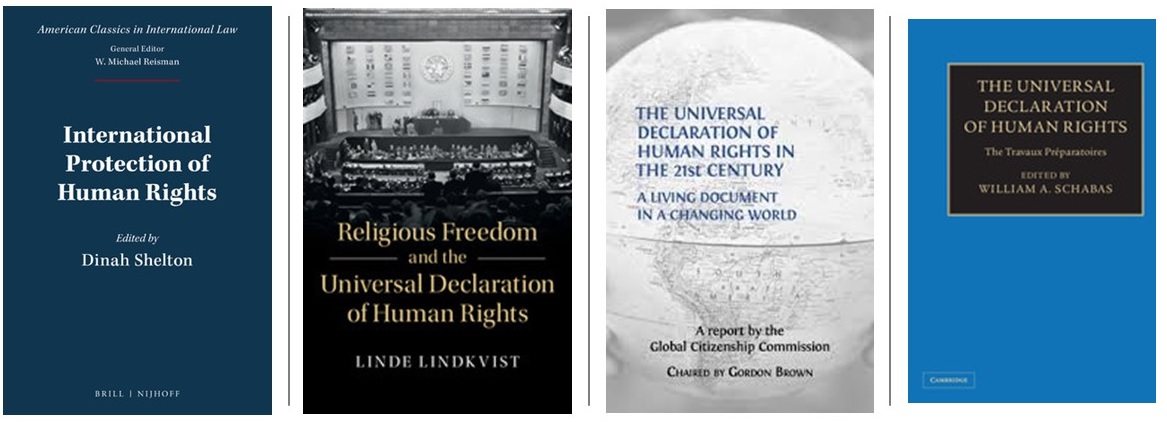On 10 December 2018, it will be seventy years since the Universal Declaration of Human Rights was adopted by the United Nations General Assembly. Thanks to the Universal Declaration of Human Rights, and States’ commitments to its principles, the dignity of millions has been uplifted, untold human suffering prevented and the foundations for a most just world have been laid. To celebrate the 70th Anniversary UN Human Rights is launching a year-long campaign on 10 December.
On 10 December 2018, it will be seventy years since the Universal Declaration of Human Rights was adopted by the United Nations General Assembly. Thanks to the Universal Declaration of Human Rights, and States’ commitments to its principles, the dignity of millions has been uplifted, untold human suffering prevented and the foundations for a most just world have been laid. To celebrate the 70th Anniversary UN Human Rights is launching a year-long campaign on 10 December.
Universal Declaration of Human Rights
The Universal Declaration was adopted by the General Assembly of the United Nations on 10 December 1948. The Universal Declaration was adopted in the aftermath of the horrors and suffering of the Second World War and has been the cornerstone of the development of a global project committed to the protection of human rights, a project which the Preamble to the Universal Declaration declares to be ‘the foundation of freedom, justice and peace in the world’. The Universal Declaration was the first time that countries agreed on a comprehensive statement of inalienable human rights. It declares that human rights are universal – to be enjoyed by all people, no matter who they are or where they live. The Universal Declaration includes civil and political rights, like the right to life, liberty, free speech and privacy. It also includes economic, social and cultural rights, like the right to social security, health and education.
The Universal Declaration is not a treaty, so it does not directly create legal obligations for countries. However, it is an expression of the fundamental values which are shared by all members of the international community. And it has had a profound influence on the development of international human rights law. Some argue that because countries have consistently invoked the Declaration for more than sixty years, it has become binding as a part of customary international law. Further, the Universal Declaration has given rise to a range of other international agreements which are legally binding on the countries that ratify them. These include:
- the International Covenant on Civil and Political Rights; and
- the International Covenant on Economic, Social and Cultural Rights.
Other binding agreements which expand on the rights contained in the Universal Declaration include:
- the Convention on the Elimination of All Forms of Racial Discrimination 1965;
- the Convention on the Elimination of All Forms of Discrimination against Women 1979;
- the Convention Against Torture and Other Cruel, Inhuman or Degrading Treatment or Punishment 1984;
- the Convention on the Rights of the Child 1989; and
- the Convention on the Rights of Persons with Disabilities 2006.
70th Anniversary and Campaign
According to the UN Human Rights, the 70th anniversary is a chance for the world to celebrate the gift of the Universal Declaration and to highlight and reaffirm the importance of its enduring human rights principles and standards worldwide. The UN Human Rights campaign has three core objectives: to promote, engage and reflect. The aim is to engage a broad base of audiences the world over, to help promote understanding of how the Universal Declaration empowers us all, and encourage further reflection on the ways that each of us can stand up for rights, every day.
- Genugten van, W., The Universalization of Human Rights in Hoogstraten, van, S. New challenges to international law : a view from The Hague, Leiden, Boston, Brill Nijhoff, pp 100-114, 2018.
- Brown, G., The Universal Declaration of Human Rights in the 21st century: a living document in a changing world : a report, Cambridge, Open Book Publishers, New York, NYU Global Institute for Advanced Study, 2016.
- Lindkvist, L., Religious freedom and the Universal Declaration of Human Rights, Cambridge, United Kingdom, Cambridge University Press, 2017.
- McDougal, M.S. and G. BebrHuman, Rights in the United Nations, in Shelton, D., International protection of human rights, Leiden, Boston, Brill Nijhoff, pp. 589-634, 2017.
- Schabas, W.A., The Universal Declaration of Human Rights : the "travaux pre´paratoires", Cambridge, Cambridge University Press, 2013.
- Eide, A. and T. Swinehart, The Universal Declaration of Human Rights : a Commentary, Oslo, Scandinavian University Press, 1992.
More publications in the Peace Palace catalogue about the Universal Declaration of Human Rights.
